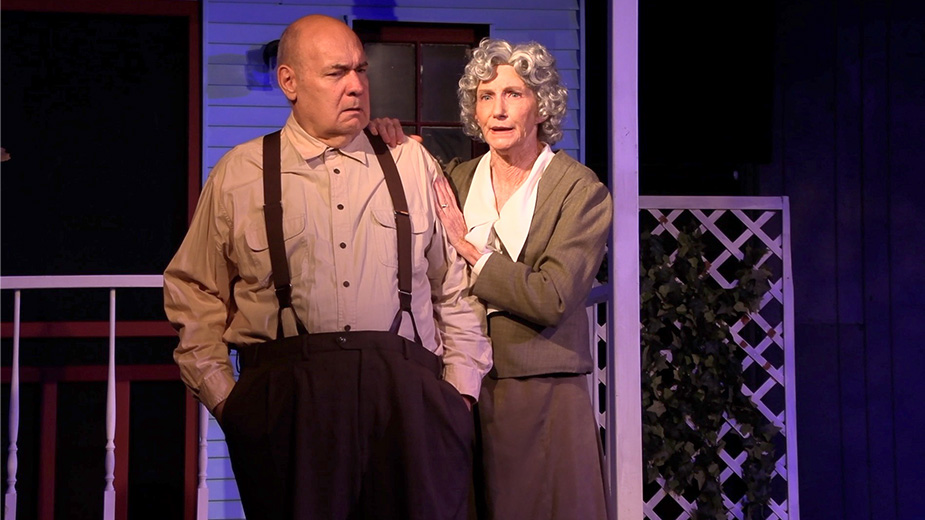Stage Review: Delightful ‘Morning’s at Seven’ Unfolds at Hopewell Theatre
By J.E.Ballantyne, Jr.
YOUNGSTOWN, Ohio – Families and family situations can provide both high drama and high comedy in the theater world. “Morning’s at Seven,” which opened Friday night at the Hopewell Theatre, certainly falls into the comedy category but also adds a bit of sentimentality to round off the edges.
Written by Paul Osborn, the plot follows four aging sisters in the late 1930s, as they deal with family problems, bickering, marital decisions, and a whole host of underlying feelings and emotions. To add spice to the proceedings, three of the sisters, along with husbands, live next door to each other.
Cora along with husband Thor and an old maid cantankerous sister named Arry are anxiously awaiting the arrival of next door neighbor and nephew Homer and his fiance, Myrtle.
Gerri Jenkins turns in a strong performance as Cora, who seems to be the anchor in that particular household. She presents a strong character with a very strong will especially when it comes to a long kept secret of moving to another house just a short distance away. Yet, with that strong will, Jenkins breathes a gentle air of believability into the role. She adds an air of practicality to the character that serves as a calming influence at times.
Husband Thor is brought to life by Craig Petrie. Thor is certainly the “man” of the house but gets caught in the middle on many occasions in spats between Cora and Arry. Petrie seemed to warm into the role after a rather stiff start in Act I. It wasn’t that his character portrayal was problematic but more so that his delivery of that character seemed offbeat for a bit. Once the show got rolling, so did Petrie.
One of the more interesting characters in the piece is that of Aronetta, or Arry, played by Lynn Nelson Rafferty. Arry lives with sister Cora and husband Thor. And, of course, with any living arrangement of that sort, there are always squabbles and underlying problems. Rafferty, as always, turns in a first rate performance.
She makes a sullen, cantankerous, hardened-by-her-years character a real fun ride to be on. Rafferty has that talent to play almost any sort of character with ease as she pulls the audience into the interior of that character. This is no exception. She really makes the show flow as she pops in and out with numerous revelations.
On the other side of the backyard we find sister, Ida, played by Amy-Anne Kibler and husband Carl, played by real life husband, Eric Kibler. Ida has a strained life, as she is in a constant fret over Carl’s “spells” that come and go, throwing the family into a tizzy. Kibler shapes a strong but worrisome Ida as she deals with Carl’s eccentricities and son Homer’s uncertainties.
Kibler’s comedy sense is strong as Ida shifts emotions frequently but always with a comic edge that make her endearing to the audience. Eric Kibler, as Carl, has a little tougher job. Much of his character in the early going is communicated by moments of silence and confusion. Kibler is on top of it every moment.
As he strives to find out “where he is in life,” he laments not becoming a dentist and sees himself as a failure. So much so, that his “spells” spin him into long periods of hugging trees and humorous moments of rambling dialogue. Kibler’s technique creates a character that gets the audience’s empathy but at the same time is humorous.
A pivotal moment early in the show is the arrival of Homer, Ida and Carl’s son, as he brings his fiance, Myrtle, home to meet his parents. They have been dating for seven years but nobody has ever seen her. Frank Martin turns in a great performance as the indecisive “mama’s boy” who is content, at least for now, to keep the relationship as is. His scene at the beginning where he pleads with mom not to leave him alone with Myrtle is first rate; after all, he doesn’t have anything to talk to her about. Probably not – he said it all seven years previous.
Myrtle, played by Leslie Whetstine, is a breath of fresh air in this production. She plays an energetic, flighty, breezy, and somewhat overzealous “bride-to-be” – well, sometimes, at least. Her character contrasts every other character in the show, not just due to age, but also due to a seemingly never ending positive outlook. She is fun to watch.
Not all family members, however, live in this neighborhood. In wanders sister Esther, who lives nearby. Molly Galano turns in her usual dynamic performance as the eldest of the four sisters and the one that seems to be the peacemaker, or, at least, tries to be. It seems that Esther has been told by her husband, David, to never visit these people that he considers to be morons, and if she does she will be relegated to living on the second floor of their house while David resides on the first floor.
Galano’s talent again gives the audience a character that they can relate to and is totally believable regardless of the absurdity of the situation.
Bill Rees plays the stern and unbending David who refuses to lower himself to associating with this family riff-raff. Rees’s portrayal, as well as his physical posturing of the character of David, almost present a tyrannical aspect to David. But even so, Rees still maintains a humanity with the character that makes him appealing to the audience. His all-black attire is a stark contrast to the other characters and their personalities.
Director Jeanine Rees has assembled an elite cast of local actors for this production. Her handling of each character, and the show in general, shows a real love for the play and the characters portrayed.
Set design by Rosalyn Blystone and Regina Rees was well thought out and executed. The two houses reflect the period along with set dressing that add that special element of realism to the locales.
Costumes by Regina Rees also follow that same pattern. Well done.
Adam Dominick provided a complementary lighting design which added atmosphere and color and provided additional realism to the set.
“Morning’s at Seven,” written somewhere around the late 1930s, holds up very well because it deals with basic human emotions and situations, but it does it in a humorous way. And this production presents a funny, heartwarming way to spend a couple of hours. Catch it while you can. It’s nice, easy entertainment.
“Morning’s at Seven” continues Sept. 7, 13, 14 at 7:30 p.m. Sept. 15 at 2 p.m.
Pictured at top: Eric Kibler and Molly Galano in a scene from “Morning’s at Seven” at Hopewell Theatre.
Copyright 2024 The Business Journal, Youngstown, Ohio.



